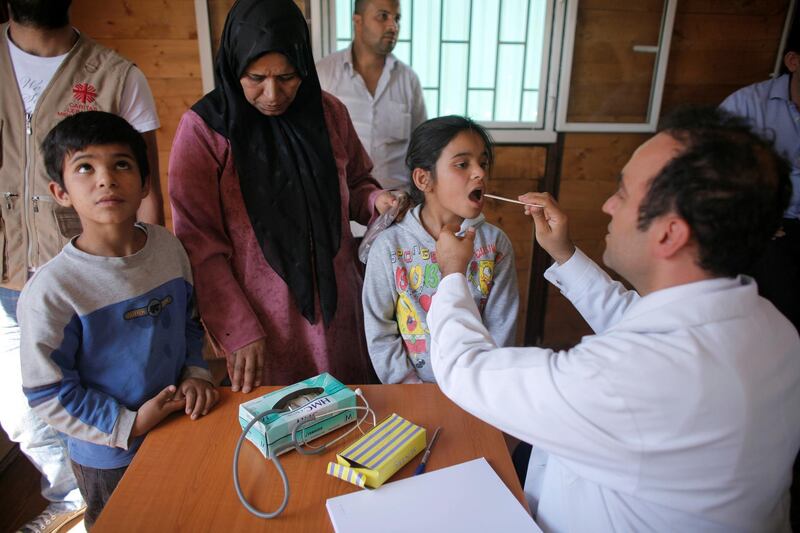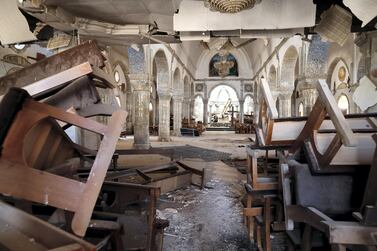For Saad and his two sisters, helping hands have been few and far between.
The three siblings fled violence in their native Iraq to neighbouring Jordan in 2012, where they have waited for six years for their resettlement application to the US be finalised.
With the international focus on the 1.3 million Syrian refugees who fled to Jordan since 2011, no European, American or regional aid organization or UN agency has provided the three young Iraqis with food or assistance.
Despite holding university degrees, the three are unable to work legally due to restrictions on work permits for Iraqis in Jordan. Having used up their life savings three years ago, Saad and his two sisters sit in their rented apartment in Amman with only one reason they can still pay rent and fill the lone gas cylinder used to heat their apartment – Caritas.
"Caritas are the only people who recognise we exist here," the 32-year old Saad told The National. "If it wasn't for them, we would be out on the streets."
Caritas Internationalis, a confederation of 165 Catholic relief and development organisations that act as the humanitarian arm of the Vatican, has been quietly providing relief and a humanitarian lifeline for hundreds of thousands of refugees and displaced and marginalised people across the Arab world.
Although Caritas does not look to advertise its activities, its commitment to humanitarian relief has led it to fill in where wars and economic crises have left people behind.
Established in Germany in 1897, Caritas’s first large-scale humanitarian operations in the Arab world came during the 1967 Arab-Israel war which drove hundreds of thousands of refugees across the West Bank and Jordan. It has since been active in Lebanon, Iraq, Egypt, Syria, Jordan and Tunisia.
But 2011 was a turning point for Caritas with the outbreak of the Syrian war.
In Jordan, the influx of more than a million Syrians saw Caritas expand to 22 centres across the country and more than triple its employees from 120 in 2011 to 450 currently.
Today Caritas runs 20 schools in the kingdom for 8,000 Syrian children who have been out of school for years, providing a special curriculum in parish schools across Amman along with teachers, transportation, school uniforms and snacks.
More than 100,000 Syrians and disadvantaged Jordanians have come to rely on Caritas’s free clinics and dentistry at its centres; the organisation refers cases requiring surgery, X-rays, and more advanced treatment to charitable Church-linked hospitals free of charge.
Meanwhile, Caritas provides monthly cash assistance to thousands of Syrian and Iraqi refugees such as Saad, offering as much as JD160 (Dh 830) per household per month, in addition to offering renovate the rundown, at times unsafe, apartments and storage lockers rented to refugees in low-income neighbourhoods.
In Syria itself, Caritas transformed its mission assisting Iraqis to providing lifesaving assistance to Syrians themselves. Caritas has provided food assistance, clothing, educational services, housing assistance and psychological support services to more than a million people across Syria.
In Jerusalem, the West Bank and Gaza, Caritas has evolved the humanitarian services it has provided for more than 50 years. In addition to running health centres and mobile clinics that serve 30,000 Palestinians, Caritas has shifted its focus to infrastructure, agricultural, development and income-generating projects, including a micro-credit programme to provide loans for small businesses, housing and education.
Caritas in Iraq has also expanded since it began in 1992. Initially providing assistance and food aid to Iraqi civilians affected by the international embargo imposed on the country, today it runs eight centres across Iraq in addition to a shelter for displaced families, offering support to more than 11,000 households.
Despite being the humanitarian arm of the Church, Caritas doesn’t proselytise or discriminate by faith – the vast majority of beneficiaries across the region are Muslim. It is a sign, the Church says, of its interfaith goodwill and a gesture of human fraternity.
“Caritas and the Vatican do not discriminate by religion, ethnicity or creed as our mission is to help all of God’s people,” says Father Rifat Bader, director of the Amman-based Catholic Centre for Media Studies. “We believe it is time to help vulnerable people, it is not the time to preach to them.”
Caritas shares a close relationship with Pope Francis; the two have been closely intertwined since the Argentine became pontiff.
As a bishop, Pope Francis was heavily involved with the organisation’s outreach to the poor in Rome and South America. As pope, Francis has launched Caritas campaigns, mentioned Caritas frequently in his speeches and even auctioned off a motorcycle given to him as a gift to raise €240,000 (Dh1 million) for Caritas’s Rome soup kitchen.
From Jordan in 2014, he hailed Caritas’s work in the region, and the importance of continuing “the charitable work undertaken by Church institutions such as Caritas Jordan and others who assist the needy regardless of their religious beliefs, ethnic origin or politics”.
In 2016, Pope Francis and Caritas used their platforms to launch “Syria: Peace is Possible”, a campaign to push world leaders, organisations and citizens across the world to end the war and suffering in Syria.
“I would like to address all the faithful and all those who work with Caritas to build a just society … to spread the message of peace, a message of unity and hope. Peace in Syria possible,” Pope Francis said in a video message to launch the initiative.
One year later in 2017, Caritas, again led by Pope Francis, launched a joint “Share the Journey” campaign, an ongoing awareness initiative spearheaded by the pope urging host communities, migrants and refugees to come together, share their experiences and break down barriers.







